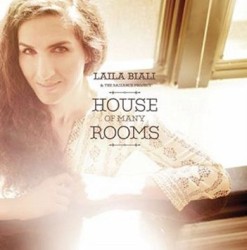House of Many Rooms
By Laila Biali and The Radiance Project
$9.99-$12.99
By Emmett Robinson Smith
Laila Biali took a risk. The Vancouver-born, Brooklyn-based singer/songwriter has received many accolades and awards for her work as a jazz pianist and singer. Her album Live in Concert was recorded at the renowned Glenn Gould Studio in Toronto in 2012, she has recorded with Sting, and she won SOCAN Composer of the Year and Keyboardist of the Year at Canada’s National Jazz Awards. However, her new album, House of Many Rooms, is not a jazz album at all. Thanks to her teaming up with the band The Radiance Project, it’s indie pop.
Biali’s extensive acclaim, though impressive, must be something of a burden: critics have high expectations of her work. It’s remarkable, then, that on her latest collection, she sounds so carefree. “Look ahead / With your eyes upon the breaking dawn,” she sings on the opening track “Shadowlands,” over a backdrop of triumphant horns, a peppy syncopated piano loop and up-tempo percussion. There’s even a gospel choir featured to drive home the song’s joyous nature, which can be attributed to The Radiance Project.
Biali’s strongest asset is her singing. Her knack for adding warmth and subtle colours to her voice is a skill largely missing from the current pop landscape. Her voice as she sings, “The sparks between us / They glow like fireflies at night,” on the track “Come Anything” is nuanced, welcoming and comforting. You can almost see her smiling as she delivers the lines. Indeed, light and love are prevalent motifs throughout the album.
“Come Anything” is also representative of an unfortunate, and probably inadvertent, quirk that many of the album’s eleven tracks carry: it sounds weirdly Christmasy. On this track, the choice to raise the key by a semitone in the middle of every verse contributes to the Christmas vibe, as well as the ebbing piano arpeggios and grandiose string arrangement.
This baffling holiday ambiance subsides as the album reaches its peak with the back-to-back songs “You” and “Upside Down.” Biali is at her most aggressive on “You,” delivering slights such as, “I bet you feel weak / Like a man who stopped trying,” over a heavy waltz arrangement. This is one of the album’s more abrasive tracks, and by the time the listener reaches it, it’s welcome, considering that the three songs leading up to it utilized more conventional melodies paired with pastoral depictions of birds, life and starlight.
The following “Upside Down,” the unmistakable peak of House of Many Rooms, is an epic work beginning with a complex, rhythmically ambiguous drum pattern. Biali rides this groove with ease as she sings. The song then evolves into an heroic chorus that evokes space exploration and planetary discovery. “You turn me upside down,” she sings, which cleverly mirrors the unexpected transition of grooves between the verse and the chorus. The song ends with a blistering minute-and-a-half saxophone solo.
Ultimately, Biali is a songwriter with a lot to offer as she enters the pop genre. The Radiance Project adds valuable instrumentation to create a full, energetic sound. Though a couple tracks come up short – “Shine” would have been an easy deletion from the album as it prioritizes prettiness over substance – Biali’s potential as a pop songwriter is apparent on more than half the album. Given her success in the jazz world, it would have been a lot easier for her to stay rooted in that genre. Her choice to experiment is commendable. And with the varied sonic palette Biali chose on House of Many Rooms, one gets the feeling that she’s on the path to a refined, distinct pop sound.
Emmett Robinson Smith is a music journalist and classical pianist at UVic.

{ 1 comment… read it below or add one }
Very thoughtful and informed musical analysis - & well-written. Very balanced.